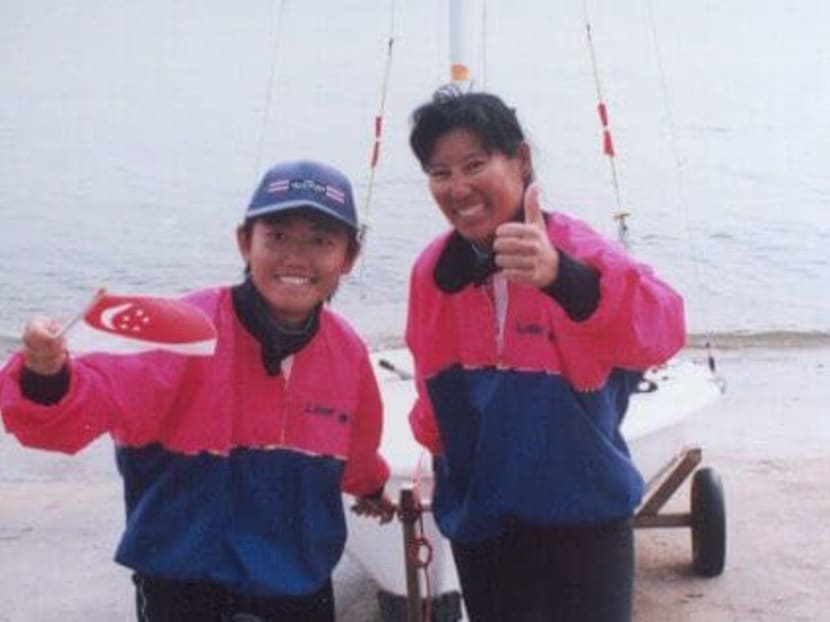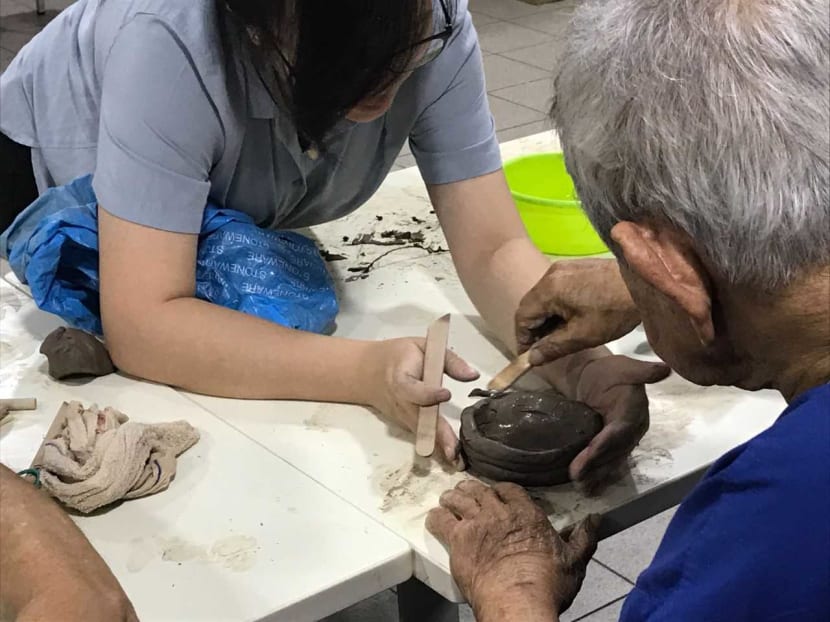Doctor turned potter uses calming effects of ancient craft to tackle modern mental health issues
SINGAPORE — Ms Joan Huang studied medicine, worked for two years as a doctor at various Singapore hospitals, but then her career path took a rather unlikely turn — she set up a social enterprise using pottery as therapy to nurture mental wellbeing.

Ms Joan Huang noticed that practising pottery helped calm her down from the stresses of daily life, so she decided to leave medicine and start a social enterprise that offered this therapy to other people.
SINGAPORE — Ms Joan Huang studied medicine, worked for two years as a doctor at various Singapore hospitals, but then her career path took a rather unlikely turn — she set up a social enterprise using pottery as therapy to nurture mental wellbeing.
Ms Huang, 36, was in the national spotlight as a champion sailor two decades ago. She and sailing partner Naomi Tan became Singapore’s first female sailors to win gold — at the Asian Games in 1998. Now she is making a splash in a less public way, navigating the sometimes choppy waters of mental health with another hobby she loves, pottery.
It all started with what she calls a “light bulb” moment. Ms Huang saw the need to address mental health issues in some of the people around her and eventually made the connection with pottery, a hobby from her university days, in an attempt to tackle the issue in a novel way.
“I realised that, you know, when you’re very busy with your day to day, when you come and do pottery, as much technical skill is involved, and sometimes no matter how bogged down you are with work, whatever is bothering you, you just have to be very ‘in the moment’ to create your art works… you just sort of have to calm down, it’s very therapeutic”
That insight led to Center Pottery, a social enterprise she founded and runs, that seeks to use pottery as a means to help people cope with mental health issues. Ms Huang worked with two psychiatrists to develop the programme’s curriculum.

Ms Joan Huang (left) and sailing mate Naomi Tan in Bangkok for the Asian Games in 1998, where they became the first female sailors to win gold for Singapore. Photo: Joan Huang
The enterprise, set up in late 2016, works with the Institute of Mental Health (IMH), which refers patients to her subsidised ceramics programme. It also works with nursing homes across the island, offering classes to both the residents and visitors at the homes.
Its sister outfit, 3 Arts, is a complementary ceramics studio workshop that offers lessons to develop pottery skills.
OVERWORKED MENTAL HEALTH PROFESSIONALS
Fresh out of the University of Pennsylvania with a Bachelor of Medicine, Ms Huang spent two years working at hospitals here, including various rotations in the wards at Changi General Hospital, the IMH and other hospitals as a general doctor.
She observed the shortcomings of mental health awareness, and that eventually catalysed her departure from the profession in early 2016. Through her medical rotations, she witnessed what she felt was an unhealthy ratio of doctors to patients, leading to overworked medical professionals. She began to understand the scale of the problem — just how many people around her were struggling with mental health issues.
Most people suffering the major conditions — depression and anxiety — did not seek professional help, to Ms Huang’s surprise.
“I think as very high functioning individuals like my friends right, even when they feel a little bit down, you always believe you can cope, because you need to excel in school, like most things that you do. I don’t think my friends and I like to feel like failures or that we cannot overcome difficulty,” she said. “Like maybe for the super high-functioning individuals I think...we usually reason a way out of seeking some medical help.”
But it was only when she was sharing these observations at mental health workshops she attended outside of work that she was hit by the “light bulb idea” to venture into her own business using pottery.
“I just wanted to attend the workshop to share my experience at the hospitals, not really wanting to start my own business, where it just came to me like a light bulb idea. Everybody says that pottery is very therapeutic. You know, why not? Why not use that as a form of art therapy?”
Ms Huang noted a dearth of this more holistic approach to mental health issues, saying that art therapists often hesitate to go all out with their pottery curriculum because the “firing process is very tedious behind the scenes”.
“I was like ‘hey this is quite a good idea’. How about we do something very different which is not out there in the market, which I personally think helps me when I feel very stressed out or I just want an outlet for me. If it helps me, maybe I can help other people also.”
Over the next month, Ms Huang was driven by her passion — a deep-seated belief — that she could use art therapy to provide people with an effective outlet to navigate their mental wellbeing that did not necessarily involve pills or other conventional treatment.
Initially, she held classes with her family and friends before eventually reaching out to organisations to partner with. But with her medical background, starting a business did not prove all that easy for Ms Huang.
“Because in a hospital there is like a team, whenever you are not sure about something you can always ask the senior doctor. But when you are an entrepreneur you are kind of solo, and it’s a very new skill set that I never learnt at school.”
Ms Huang turned to some of her sailing friends, who had gone on to become entrepreneurs starting their own businesses, for “help and advice”. “Those who are very successful business people are those who are very street smart,” she said. It also helped that her own family had a history of running businesses.
FULL SUPPORT FROM FAMILY, FRIENDS
After she left her prestigious medical career in 2016, her family and friends offered full support — they understood her motivations even if the move was unconventional.
“I want to help people. You don’t know how you can help when you always feel that it’s just one person, it’s just the effort of one person. I guess as you do more, you kind of snowball and build momentum,” she said.
Given she chose medicine to study, she was always looking to help people — so moving to a social enterprise came naturally. “I just saw a need for it and went for it.”
Three years into the project, Ms Huang can see herself doing this “for life”.

Ms Joan Huang's social enterprise Center Pottery uses the ancient craft as a therapy to nurture mental wellbeing. Photo: Lauren Ong
“When I think back about my younger days when I was very successful in sailing, it was because I really enjoyed it. For sailing, I trained for many years and because I really enjoyed it, it made me successful in the sailing field. Maybe career-wise I should be the same, I should just do what I really enjoy and see where it takes me.”
Of course there is a financial dimension to her change of career.
While her conventional coveted medical career might have taken a backseat in the pursuit of bettering mental health, Ms Huang recognises that her “profits that come with starting a social enterprise are really thin”.
“I guess, everyone just wants different things in life... that’s just it.”









